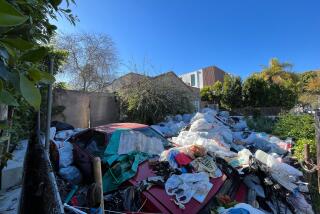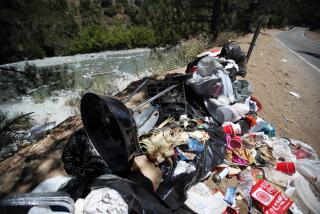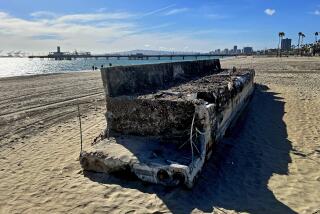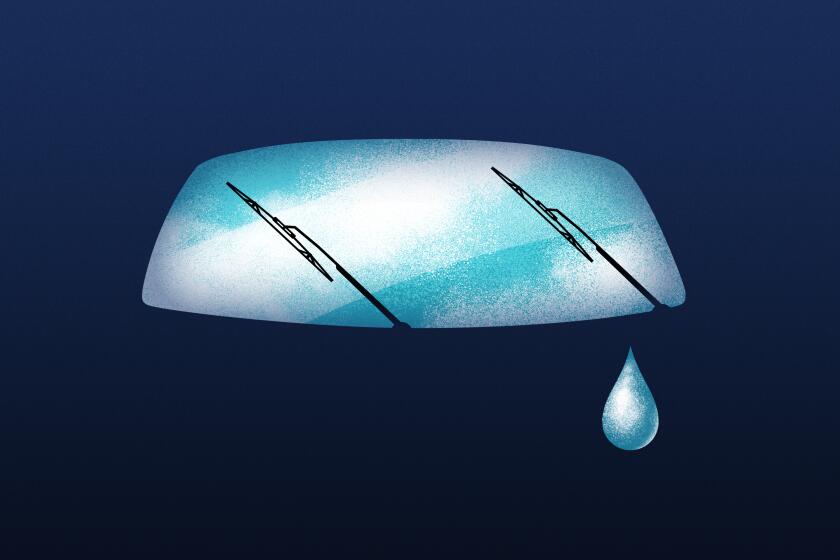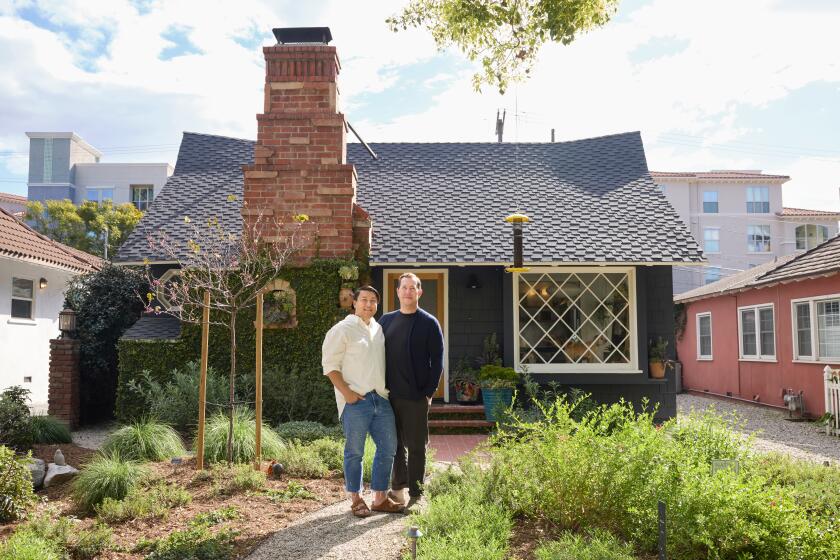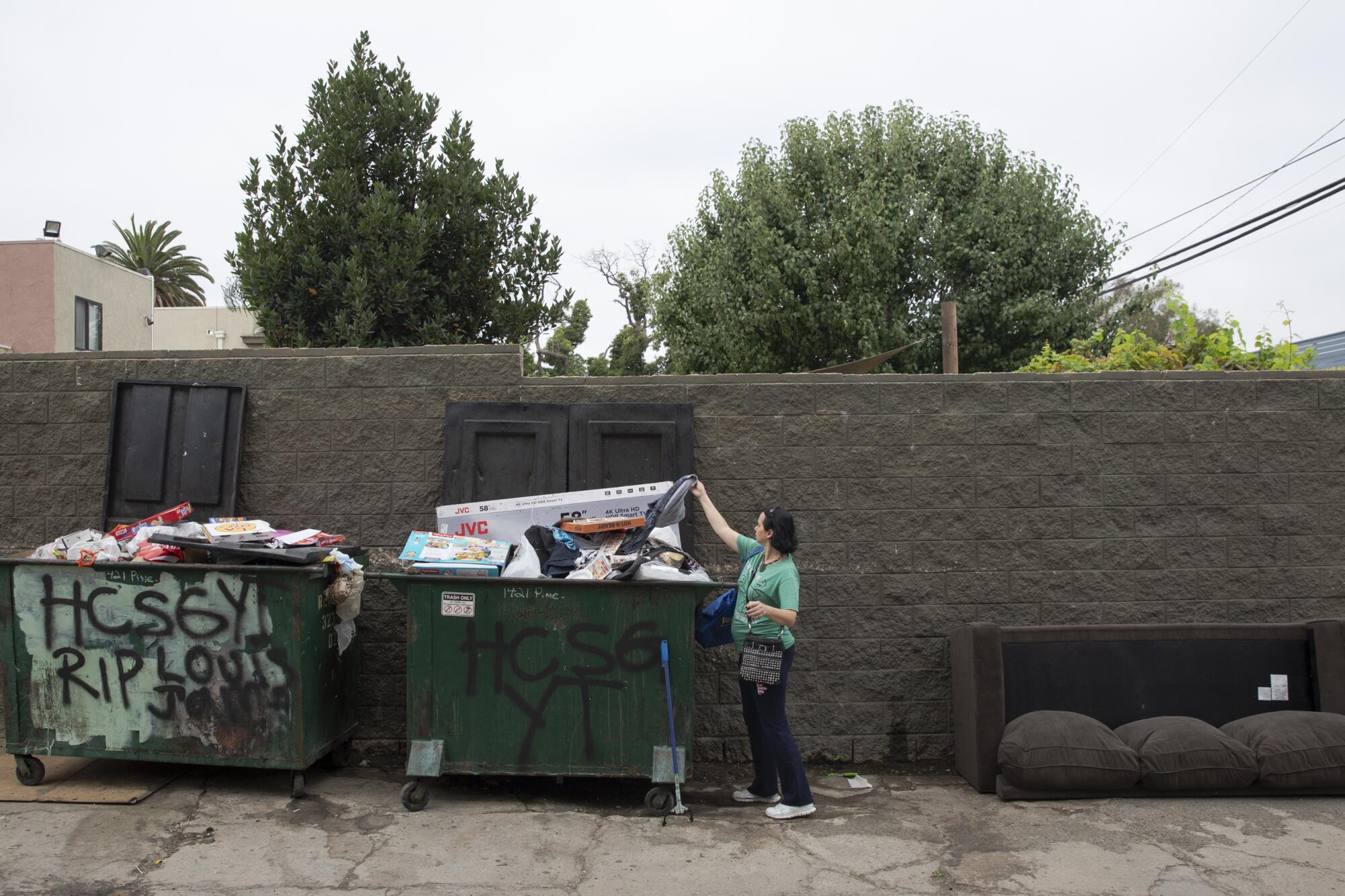
Amber Elizabeth Stevens’ studio apartment in Long Beach seems to have everything she might need. The blue front door opens to her sanctuary, a room that alternates between a living room and a bedroom. A floral curtain covers a wardrobe filled with Aeropostale jeans and Victoria’s Secret loungewear. Three Dell desktops cover the top of a study table. Stacks of books sit in plastic crates perched atop one another, creating a makeshift bookshelf.
The only thing that’s different from the average American household is this: Stevens found most of what’s here in a dumpster.
The 48-year-old, who is a freelance internet marketer, has been dumpster diving for more than 10 years. The decor in her Pine Avenue home came largely from neighborhood trash bins, she said.
Grinning, Stevens thrusts her latest find in the air. “This is Pomegranate by Marc Jacobs,” she said of the $130 fragrance. “Can you believe that? I found this during one of my strolls.”
Often scorned as unsafe or unsanitary, dumpster diving is legal in California, according to a 1988 Supreme Court ruling. But divers can be arrested or fined if they trespass or litter. Stevens is mindful of that, so she always cleans up after herself and sometimes after others, many of whom, like her, are appalled by the wastefulness they see and the impact of that on the environment.
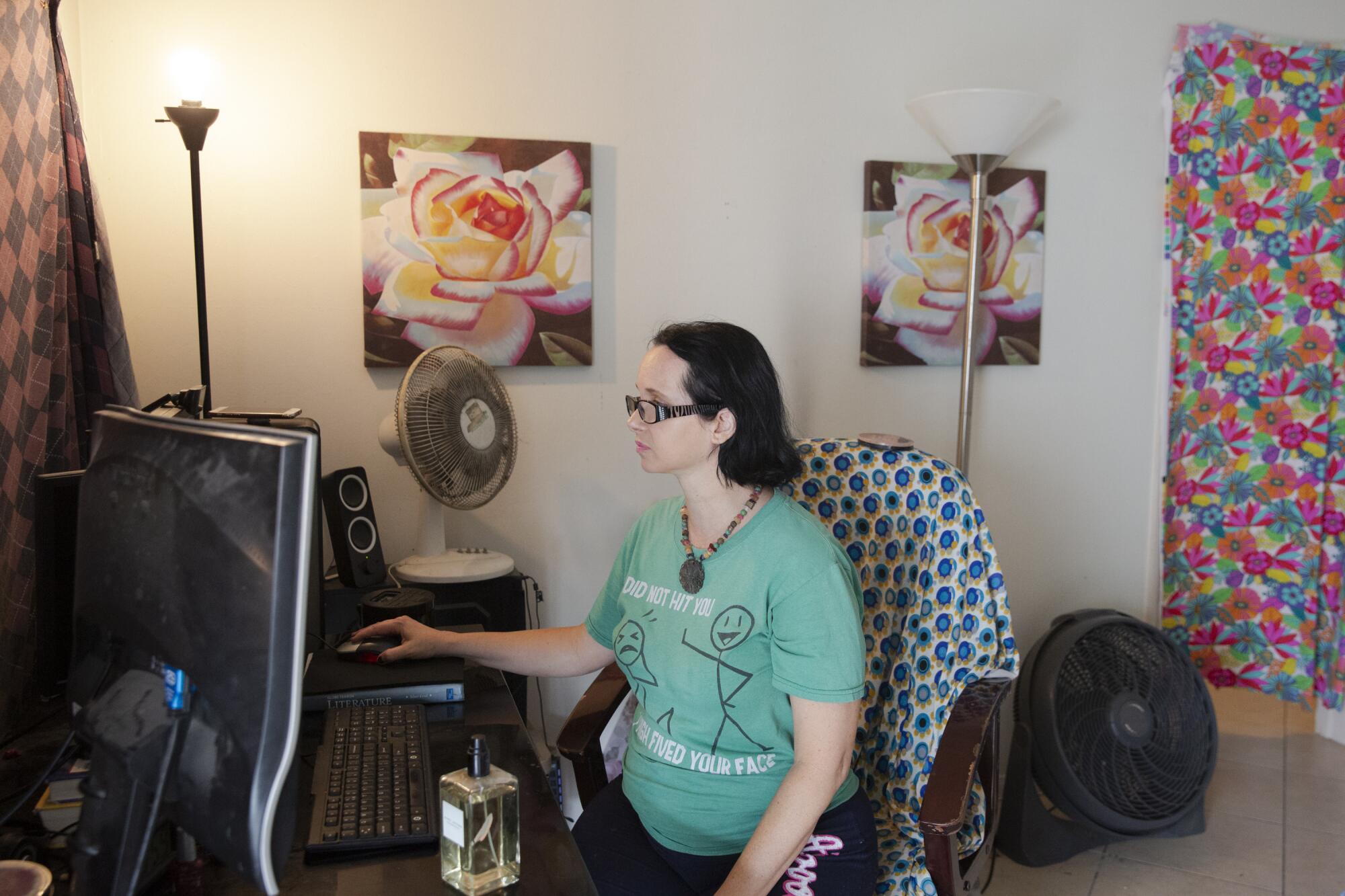
Her treasure hunts begin as early as 9 a.m., and she sometimes goes twice a day.
“Most divers will go out at night or early in the morning,” Stevens said. “You want to get there before the trash truck comes.”
A stylish woman, Stevens doesn’t compromise on her looks even during her dives. Her black-rimmed glasses sit on the bridge of her nose as she begins to explain her way of life. She’ll occasionally make light of her choices. “Honey,” she said, “I don’t care what people think.”
Her lips outlined in glossy pink and her eyelids highlighted with bronze shadow (a dumpster find), she is ready to search her neighbors’ trash.
Before leaving the apartment, she picks up George, as she calls her trusty grabber tool, and a blue tote to stash her finds.
A lifestyle, a life
When Stevens was looking for apartments in Long Beach, her search requirements didn’t include a nearby grocery store or a doctor’s office. Instead she looked for dumpsters. “You can find out a lot about the neighborhood if you just look at the dumpsters,” she said.
In contrast to the manicured front lawns of the homes and apartment buildings, the back alleys of Pine Avenue are unkempt, and the communal trash bins are overflowing. This is where Stevens finds most of her treasures. She glances into each trove and sometimes uses George to poke around.
“Aha! Look at this,” she said as she grabbed a striped Hollister top from the receptacle. “Isn’t this cute? Now you can go buy this at the store, but I just got it for free.”
For Stevens, this way of life is not about money; it’s about being “smart and resourceful.”
She estimates she has saved more than $400 in her last couple of hauls alone, bringing home clothes, shoes, handbags, even a laundry basket.
Finding discarded clothes or perfectly fine furniture in the street troubles her. “To me, it’s not only damaging for the environment but it’s money being wasted,” she said.
As she closed in on her last find of the day, a distant screeching alarm caught her attention. She raised her eyebrows and said, “I know that sound!”
It was trash trucks pulling in to collect what she had left behind and clear the path for a new cache of throwaways.
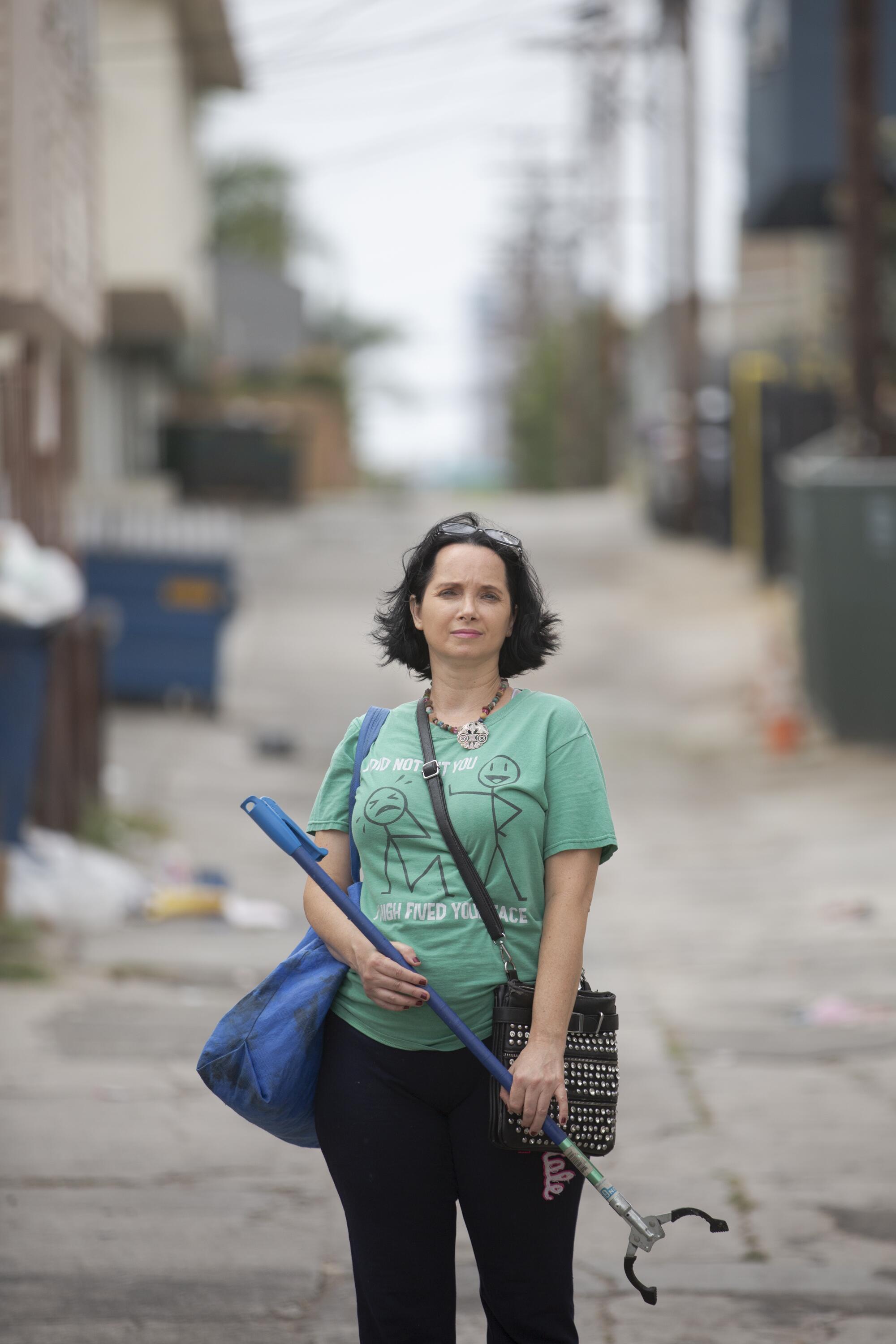
Stevens began dumpster diving in her early 30s because she had nothing after she fled an unhappy marriage. “And I couldn’t afford to buy the furniture and everything that I needed again,” she said.
On her way home one day, she found a lot of usable furniture on the curb. Two hours and a lot of pulling and pushing later, she had furnished her new home. Realizing she didn’t need money to feel financially stable was a turning point, she said.
“Dumpster diving gives me a sense of security,” Stevens said. “It makes me feel safe to know that there is always a way to get what I need.”
Birth of a subculture
What began as an effort to overcome hardships turned Stevens into an activist and a leader of a trend that has caught fire on social media, partly to teach people to save money.
Dumpster diving gives me a sense of security. It makes me feel safe to know that there is always a way to get what I need.
— Amber Elizabeth Stevens
Now a subculture, dumpster diving is documented on YouTube and discussed in online communities on Facebook and Reddit, where people go to exchange tips and find dumpster-diving partners.
There is an earth-friendly aspect to this as well.
The U.S. accounts for 4% of the world’s population but produces 30% of the planet’s waste, according to a 2018 national waste management report by the U.S. Public Interest Research Group, a nonprofit government watchdog organization.
Ivory McCracken, 20, a junior studying interdisciplinary humanities at Oakland’s Mills College, and her friends dig through rubbish to find things that can be repurposed and to prevent usable items from ending up in landfills.
McCracken often dumpster dives in the bins behind big-box stores and is shocked to see how much edible food is wasted — so much that she and her friends can feed themselves.
Even with all the positives of dumpster diving, Stevens acknowledges the stigma of it. She rejects that. “Even the stuff that you buy from stores has been touched a thousand times before you buy it,” she said. “In my eyes, there is no difference.”
Concerns of hygiene and safety often crop up during online conversations about dumpster diving. Several deem it unsanitary and unsafe.
But Stevens says it doesn’t have to be.
“The whole trick is you get in, get the stuff as quickly as possible, and get out,” she said. “You don’t want to make a mess, and you certainly don’t want to hurt yourself. You don’t have to get dirty if you don’t need to.”
Stevens washes the clothes and cleans any items she brings home.
Advertisements, Stevens said, implore people to “buy more.” But she feels there is not enough information on how to dispose of something you no longer need.
Stevens’ Facebook group of like-minded souls provides information and tips on where to find treasures; it has grown to a community of more than 1,000.
In telling people how to repurpose, she has found her purpose.
“I want to show people that there is a better way to live,” Stevens said. “You don’t have to constantly spend money to feel the satisfaction that you get when you own something new.”
More to Read
Sign up for our L.A. Times Plants newsletter
At the start of each month, get a roundup of upcoming plant-related activities and events in Southern California, along with links to tips and articles you may have missed.
You may occasionally receive promotional content from the Los Angeles Times.
